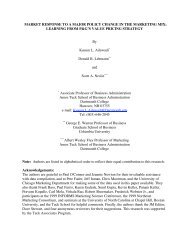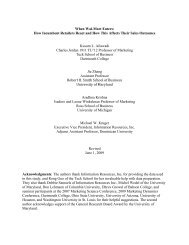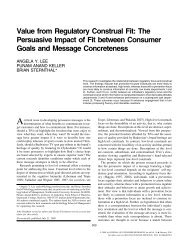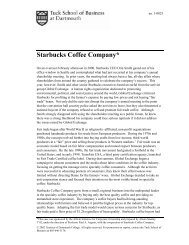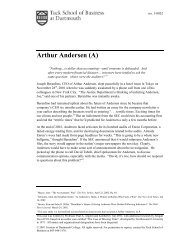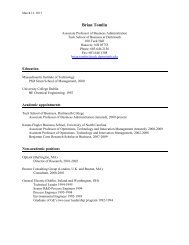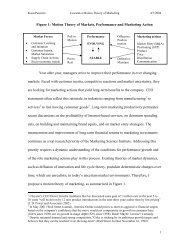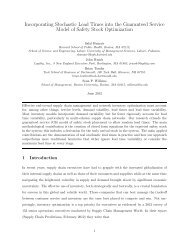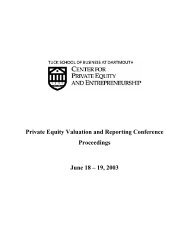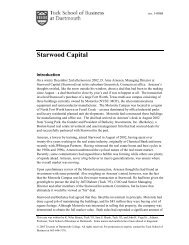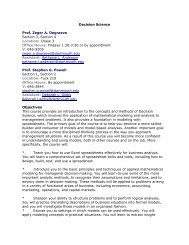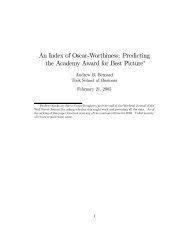tax notes international - Tuck School of Business - Dartmouth College
tax notes international - Tuck School of Business - Dartmouth College
tax notes international - Tuck School of Business - Dartmouth College
You also want an ePaper? Increase the reach of your titles
YUMPU automatically turns print PDFs into web optimized ePapers that Google loves.
dependent agent on behalf <strong>of</strong> the nonresident enterprise,<br />
together with sufficient capital to support those<br />
assets and risks. Therefore, the authorized OECD approach<br />
is the only one that leads to an outcome that is<br />
coherent with the fiction <strong>of</strong> independence provided in<br />
article 7(2).<br />
Furthermore, there is no reason why the attribution<br />
<strong>of</strong> pr<strong>of</strong>its to an agency PE should be treated differently<br />
than the attribution <strong>of</strong> pr<strong>of</strong>its to other types <strong>of</strong> PEs.<br />
The adoption <strong>of</strong> the single <strong>tax</strong>payer approach results in<br />
applying the OECD approach in different manners depending<br />
on what type <strong>of</strong> PE is involved, which is<br />
clearly unreasonable.<br />
Also, the adoption <strong>of</strong> the single <strong>tax</strong>payer approach<br />
would make article 5(5) <strong>of</strong> the OECD model superfluous,<br />
which is against one <strong>of</strong> the main principles that<br />
guides the legal interpretation process — that the law<br />
does not have useless words.<br />
Finally, considerations <strong>of</strong> a practical nature should<br />
not overcome a legal interpretation that is harmonious<br />
with the wording <strong>of</strong> the legal text, and is the reason<br />
why the authorized OECD approach should prevail<br />
over the single <strong>tax</strong>payer approach, even if the former<br />
may be a more difficult application in practice.<br />
SPECIAL REPORTS<br />
The analysis <strong>of</strong> the relevant case law shows that attribution<br />
<strong>of</strong> pr<strong>of</strong>its to PEs is still a controversial issue,<br />
although a trend towards the adoption <strong>of</strong> the authorized<br />
OECD approach can be seen.<br />
Moreover, the criticisms <strong>of</strong> the application <strong>of</strong> the<br />
authorized OECD approach to treaties currently in<br />
force are somehow weakened as the OECD Committee<br />
on Fiscal Affairs adopted, at its meeting <strong>of</strong> June 24-25,<br />
2008, the revised commentary on the current article 7<br />
<strong>of</strong> the OECD model and included it in the 2008 update<br />
to the model.<br />
Tax practice shows that there will always be room<br />
to discuss the legal status <strong>of</strong> the OECD commentary<br />
as well as the historical debate between the static and<br />
ambulatory interpretation <strong>of</strong> the commentary.<br />
Therefore, the states that concluded OECDpatterned<br />
treaties should put all their efforts into implementing<br />
the necessary changes to adopt the authorized<br />
OECD approach because only a uniform interpretation<br />
<strong>of</strong> article 7 <strong>of</strong> the OECD model among the states can<br />
ensure that no double <strong>tax</strong>ation will arise, greatly benefiting<br />
cross-border trade. ◆<br />
TAX NOTES INTERNATIONAL FEBRUARY 2, 2009 • 445<br />
(C) Tax Analysts 2009. All rights reserved. Tax Analysts does not claim copyright in any public domain or third party content.



